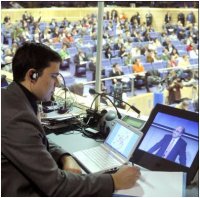The stressful life of a simultaneous interpreter
 I loved this London Review of Books article by former UN simultaneous interpreter, LynnVisson.
I loved this London Review of Books article by former UN simultaneous interpreter, LynnVisson.
I spend a lot of time working with simultaneous interpreters, and I have tremendous respect for the difficult, high-pressure work they perform.
As writers, we can only marvel at the ability to create the perfect words under pressure.
I loved this account of the pressure interpreters work under, especially when two languages share very different syntax and conference participants are anxious for immediate translations.
And audiences at international conferences can be tough, as Visson points out. Some are just waiting for an error in translation to point a righteous finger.
The skill level of UN translators is very high, but not all translation is so professional. I remember years ago attending a conference in Prague, where a German mayor of a small town was speaking. A local translator was translating his speech and – suffice it to say- her German was inadequate. Many audience members spoke good German and became quite aggressive in correcting her translations. At one point, I was certain the poor woman would burst out in tears and flee from the room. She managed to stick it out, but I’m guessing she still cringes whenever she remembers it.
On a lighter note, I went to see a Hungarian Film Festival long ago in Washington, DC. There were headsets and simultaneous interpretation from Hungarian into English. In the middle of the film, the interpreter had a coughing attack, and we heard him coughing rather than translating. It happened to be at a funny point in the film, and I enjoyed seeing how the Hungarian speakers sprinkled throughout the audience chuckled away, while the rest of us were simply baffled.
Then, of course, their are the classic cautionary stories of high-profile, disastrous bad translation. US President Jimmy Carter made an historic trip to Poland in 1977, while it was still firmly behind the Iron Curtain. An independent translator was hired, and managed to bungle that one up big time. In his speech to an enthusiastic Polish crowd, President Carter thought he was telling them how pleased he was to get to know the Polish people. Unfortunately, the translator mistranslated that into the US President hoping to ‘know the Polish people carnally’. : ) When Carter wanted to say he was only in Poland for a short visit, his words were mistranslated to the confused crowds, who were shocked to learn that the US president was defecting to Poland, and would never go home again. Talk about lost in translation…
So, hats off to talented simultaneous interpreters for all the excellent work they do. Enjoy Lynn Visson’s article – and, as readers and writers picking up translated novels, appreciate all the hard work that goes into translating writers’ stories, too.
Looking forward to reading this. I have enormous respect for simultaneous translators too. Remember the volunteer team at Matera? They are fantastic.
Yes, they are fantastic, aren’t they? Especially when they translate at those one-on-one pitch sessions. That’s tough work!
A friend of mine in university had formerly been a UN translator in NY and had good stories to tell. They do amazing work. Had never heard that Carter tale – very funny.
Isn’t the Carter story amazing? Of course, foreign relations are filled with great stories of mistranslation/misunderstandings. The importance of words…